前景实用英语 unit 1
- 格式:doc
- 大小:862.00 KB
- 文档页数:13
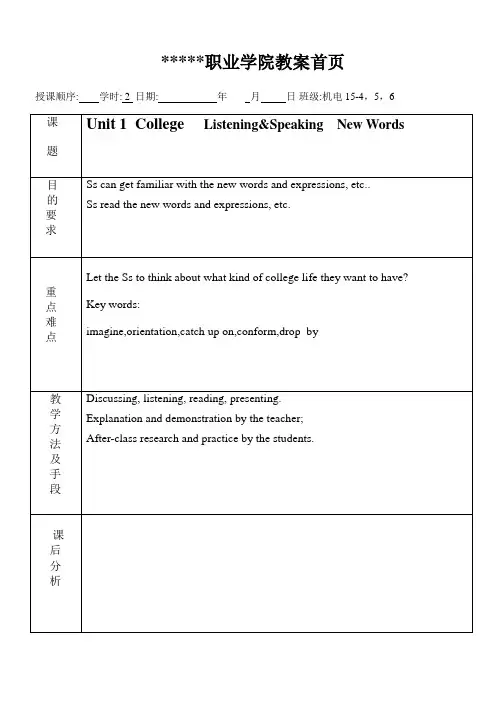
*****职业学院教案首页授课顺序: ___ 学时: 2 日期:___________ 年 ___ 月 ____ 日班级:机电15-4,5,6…………………装……………订……………线………………………教案稿纸化工职业学院第页…………………装……………订……………线………………………教案稿纸化工职业学院第页…………………装……………订……………线………………………教案稿纸化工职业学院第页…………………装……………订……………线…………………教案稿纸化工职业学院第页教案稿纸化工职业学院第页教案稿纸化工职业学院第页内蒙古化工职业学院教案首页授课顺序: _2_ 学时: 2 日期:___________ 年 ___ 月 ____ 日班级:机电15-4,5,6教案稿纸Teaching procedures: Step 1Listen to the tape and read the words and phrases,review the usages of the word.Step 2 Discussion:How do you feel about your beginning of the college life?Step 3 Listen to the tape and underlined the key words and expressions. Step 4 Intensive Reading of Text A.The Freshman Experience: College Is Not Summer CampBy Kristine Wellesley1. The first week of college is summer camp. The second is back to reality. When I arrived on campus a little over a week ago, I never imagined going from name games to essays in a blink.summer camp:夏令营 arrive on 到达 back to reality:回归现实Imagine doing sth.想象做某事I never imagined going from name games to essays in a blink.2.…… so it never really felt like school until I walked intoGeology on Tuesday morning. Before that, I had been watching movies with other freshmen, exploring—well, really getting lost in the campus, and trying every imaginable ice cream combination at the dining halls. Never…until…(never本身是否定 VS.not…until)Had been过去完成时(以过去为基点,发生在之前的事情)filled with strangers作为过去分词短语修饰room3.And then came the terrible syllabus, something I’ve never used before.化工职业学院第页教案稿纸化工职业学院第页…………………装……………订……………线………………………教案稿纸内蒙古化工职业学院第页职业学院教案首页授课顺序: _3_ 学时: 2 日期:___________ 年 ___ 月_____ 日班级:机电15-4,5,6…………………装……………订……………线………………………教案稿纸化工职业学院第页教案稿纸化工职业学院第页教案稿纸化工职业学院第页。

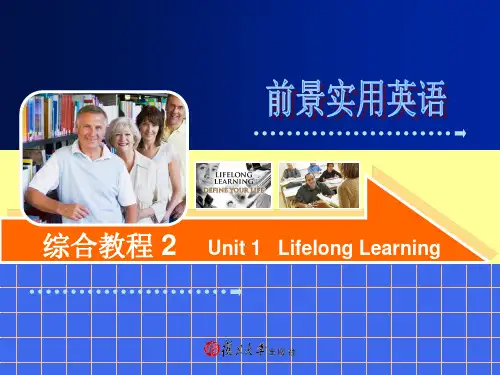
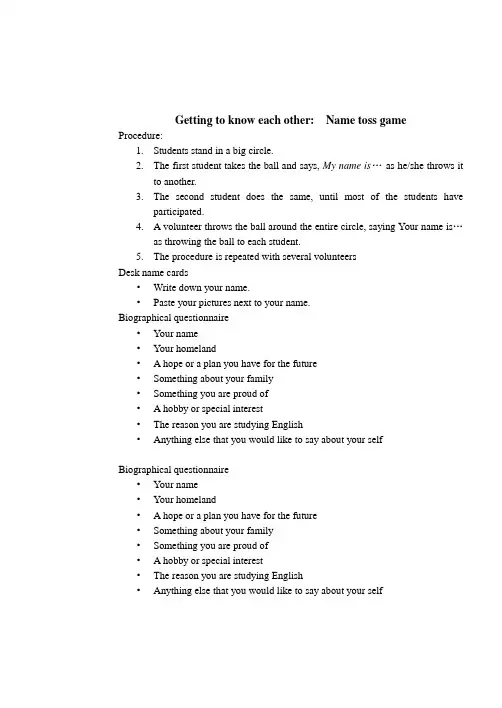
Getting to know each other: Name toss game Procedure:1.Students stand in a big circle.2.The first student takes the ball and says, My name is…as he/she throws itto another.3.The second student does the same, until most of the students haveparticipated.4. A volunteer throws the ball around the entire circle, saying Your name is…as throwing the ball to each student.5.The procedure is repeated with several volunteersDesk name cards•Write down your name.•Paste your pictures next to your name.Biographical questionnaire•Your name_____•Your homeland______• A hope or a plan you have for the future_______•Something about your family______•Something you are proud of_____• A hobby or special interest_______•The reason you are studying English_____•Anything else that you would like to say about your self______Biographical questionnaire•Your name_____•Your homeland______• A hope or a plan you have for the future_______•Something about your family______•Something you are proud of_____• A hobby or special interest_______•The reason you are studying English_____•Anything else that you would like to say about your self______Unit 1 CollegePart A●Lead-inTask 1 Study the pictures and discuss the questions below in small groups. Use the words given below if necessary.1.Who are the people in each picture? What’s their relationship?2.Where are they? What are they doing?3.Do you think they enjoy what they are doing now?Task 21.Listen and complete these dialogues.2.Retell the expereience in these dialogues by beginning with “I”, “I” can beboth A or B.Eg: (I am B.) This morning, a stranger came to ask me if the seat taken when I was in the classroom waiting for Professor Johnson to give us class. His name is Blair, a freshman. He told me that he was a little nervous about this course.Someone said this course was difficult for freshmen. I comforted him that Professor Johnson was quite a funny guy and really smart and he won’t be nervous in his class.Task 31. What did you do in the first week at college?2. What differences are there between college life and high school life?●Text A1.Expressions to learn: students are requested to give 2 or 3 examples ofeach word in Wechat as preview to the text.1) summer camp back to reality imagine doing2)in a blink explore campus get lost in3) imaginable combination dining hall4)dirt cheap fraction version5)Naiive frightening ahead of6)catch up on gossip confirm7)be piled down with keep up with scare8)informal expect sb. to do drop by9)nuisance academic expectation10)overwhelmed messy agenda2. Scanning and skimming: why college is not summer camp?3. Read the text again and answer the following questions.1)What’s the problem with buying textbooks?2)What made the writer feel frightened?3)Why did the writer love the first day of high school so much?4)Why does the writer think it’s almost impossible to join clubs orhave a little social life at college?5)What’s the writer really scared of?4.Identify the key words or main ideas of the following paragraphs (page 6,task 2)5.6. Discussion1)What’s your purpose of going to college?•For the parents•For the country•To serve the people better in the future•To get more knowledge•To get a degree2)What does going to college mean to you?●Having more fun●Making more decisions●Learning as much as possible● A bright future● A lot more than just getting a good grade3)15 things a college student should do•Learn by yourself or self-teaching•Be a volunteer once•Take part in a club or society•Cultivate a hobby•Do a part-time job•Love someone deeply; maybe find your lover for life.•Don’t forget call or write to your parents.•Try to make a business to check your financial quote•Try to organize a big activity•Read some good books•Travel out•Know about the famous people•Control your money•Make friends with students whose families are poorer than yours.•Challenges yourself6.Homework: task 3, task 4, task 5 in Page 7Part B●Lead inTask 1: Listen to the recording, and complete the following passage. Then find out the subject and the predicate in each sentence. And get familiar with the basic sentence patterns.College is a small society itself. In college, you will meet lots of people. There will be clubs, teams, parties, volunteer activities, lectures, movies, etc. You will doubtlessly have more work than you have ever had, but you will also have more free time. Also, college experience changes your ideas for life. You get rid of your feeling of importance which you had at high school and realize that in the larger picture, it doesn’t matter if you wear branded clothes or have the hottest hairstyle College also helps you feel free to start conversations with people on many topics. It’s good for you to improve your communication skills. Of course, you may feel nervous and awkward at first. It’s quite understandable. But all that will change.Apart from the enjoyment and movement, college also provides skills that you need for a wonderful career. You will have chances to learn and practice these skills. And you will get prepared for your dreamed jobs that lie ahead.Task 2 Discuss the following questions with your partner about your first year plans in college.1.How often will you go to parties with your friends?2. Are you going to join any interest groups on campus?●Text B Surviving Your Freshman Year1.New expressionsget involved with be a part ofthe most important key to sth. is…. Find a balance between … and …Barely Get by Set goals When it comes to…Spend too much time in…Be benificial to sth Get in a habitSet a schedule to sth. Dedicate time to do sth The sooner is the better. Work on sth. It is worth it. RequireA large amount of preparation and research Pat yourself on the backAs for Get familiar withAs… as possible Become involved in Better sth.2.Reading tasks in P12 and P13.3.Sentence analysis:1)It will be a pain at first, but trust me when you are finished it’s so worth it.一开始会很痛苦,但请相信,完成作业的那会儿,你会觉得这样做很值。
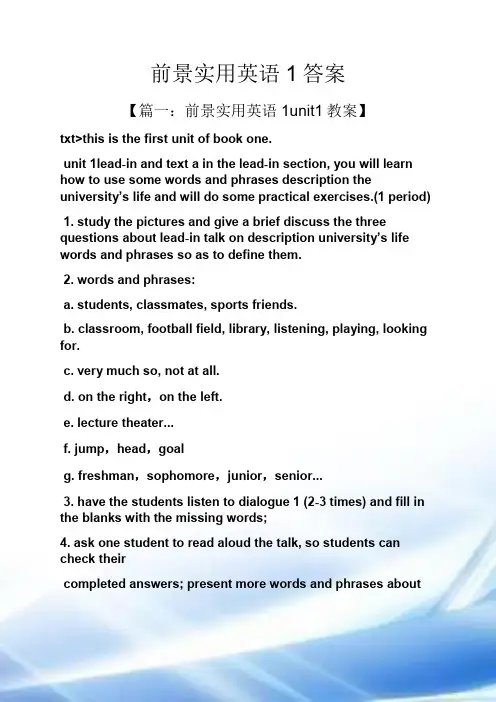
前景实用英语1答案【篇一:前景实用英语1unit1教案】txt>this is the first unit of book one.unit 1lead-in and text a in the lead-in section, you will learn how to use some words and phrases description the university’s life and will do some practical exercises.(1 period)1. study the pictures and give a brief discuss the three questions about lead-in talk on description university’s life words and phrases so as to define them.2. words and phrases:a. students, classmates, sports friends.b. classroom, football field, library, listening, playing, looking for.c. very much so, not at all.d. on the right,on the left.e. lecture theater...f. jump,head,goalg. freshman,sophomore,junior,senior...3. have the students listen to dialogue 1 (2-3 times) and fill in the blanks with the missing words;4. ask one student to read aloud the talk, so students can check theircompleted answers; present more words and phrases aboutdescription university’s life, make sure students know how to use those added words and phrases, and organize the activity toaccomplish dialogue 2.5. after a brief explanation of the dialogue1-2, the teacher gives thestudents a few minutes to think about the questions in the task3.6. ask students to answer the questions about the task3.in the text a section (1-2 period)a. lets the students answer the text-related questions(in the exercises), helps them identify the main idea of eachparagraph.b. analyzes some language points while discussing the whole text with the students.language pointsimaginev. to form a picture in your mind of what somethingmight bee.g.she imagined singing her favorite song on a big stage.她想象着自己在一个巨大的舞台上唱自己最喜欢的歌曲。


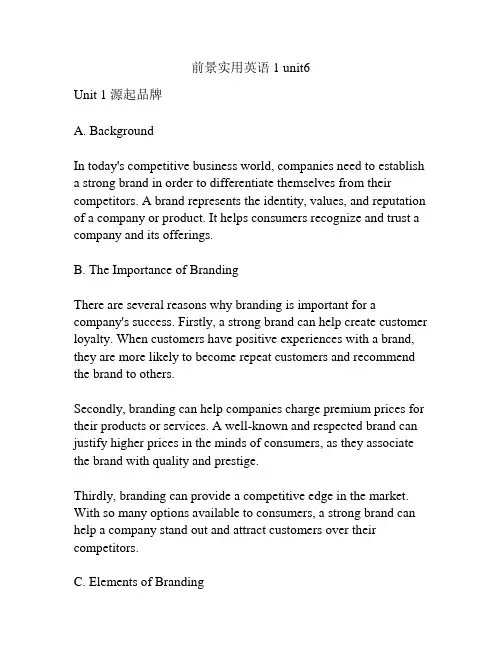
前景实用英语1 unit6Unit 1 源起品牌A. BackgroundIn today's competitive business world, companies need to establish a strong brand in order to differentiate themselves from their competitors. A brand represents the identity, values, and reputation of a company or product. It helps consumers recognize and trust a company and its offerings.B. The Importance of BrandingThere are several reasons why branding is important for a company's success. Firstly, a strong brand can help create customer loyalty. When customers have positive experiences with a brand, they are more likely to become repeat customers and recommend the brand to others.Secondly, branding can help companies charge premium prices for their products or services. A well-known and respected brand can justify higher prices in the minds of consumers, as they associate the brand with quality and prestige.Thirdly, branding can provide a competitive edge in the market. With so many options available to consumers, a strong brand can help a company stand out and attract customers over their competitors.C. Elements of BrandingThere are several key elements of branding that companies need to consider. Firstly, a brand should have a unique and memorable name and logo. These visual elements help consumers remember and identify the brand.Secondly, a brand should have a clear brand message and positioning. This involves defining what the brand stands for and how it is different from other brands in the market.Thirdly, a brand should consistently deliver on its promise. This means providing quality products or services that align with the brand's values and promises.Finally, a brand should have a strong online and offline presence. This includes having a well-designed website and active social media accounts, as well as participating in relevant industry events and conferences.D. Building a BrandBuilding a brand takes time, effort, and consistency. Companies need to invest in brand development and marketing strategies to establish and grow their brand.One effective way to build a brand is through storytelling. By sharing the company's journey, values, and impact, companies can create an emotional connection with consumers and build trust. Another important aspect of building a brand is deliveringexcellent customer experiences. Companies should focus on providing exceptional customer service and addressing customer needs and concerns in a timely manner.Additionally, companies should leverage their brand ambassadors and influencers to promote their brand. These individuals can help spread brand awareness and credibility through their personal networks.In conclusion, branding is essential for companies looking to succeed in today's competitive business environment. It helps create customer loyalty, justify premium prices, and provide a competitive edge. By focusing on key branding elements and implementing effective brand-building strategies, companies can establish a strong and recognizable brand that resonates with consumers.。
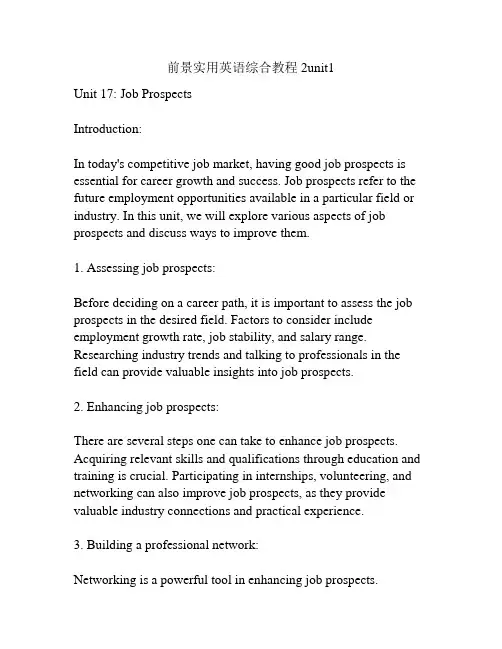
前景实用英语综合教程2unit1Unit 17: Job ProspectsIntroduction:In today's competitive job market, having good job prospects is essential for career growth and success. Job prospects refer to the future employment opportunities available in a particular field or industry. In this unit, we will explore various aspects of job prospects and discuss ways to improve them.1. Assessing job prospects:Before deciding on a career path, it is important to assess the job prospects in the desired field. Factors to consider include employment growth rate, job stability, and salary range. Researching industry trends and talking to professionals in the field can provide valuable insights into job prospects.2. Enhancing job prospects:There are several steps one can take to enhance job prospects. Acquiring relevant skills and qualifications through education and training is crucial. Participating in internships, volunteering, and networking can also improve job prospects, as they provide valuable industry connections and practical experience.3. Building a professional network:Networking is a powerful tool in enhancing job prospects.Attending industry events, joining professional associations, and utilizing online platforms like LinkedIn can help build a strong network. Networking provides opportunities to connect with professionals in the field, learn from their experiences, and gain insider knowledge about job opportunities.4. Developing transferable skills:Transferable skills are abilities that can be applied across different professions and industries. Developing these skills can significantly improve job prospects. Examples of transferable skills include communication, problem-solving, and leadership abilities. Identifying and highlighting these skills in a resume or job application can make a candidate more marketable.5. Keeping up with industry trends:Staying updated with industry trends and advancements is essential for job prospects. This can be achieved by reading industry publications, attending conferences and workshops, and staying connected with professionals in the field. Knowledge of current trends and emerging technologies can make a candidate stand out in the job market.6. Embracing lifelong learning:In today's fast-paced and ever-changing world, continuous learning is essential for career growth. Embracing lifelong learning through courses, certifications, and workshops can enhance job prospects. Employers are often looking for individuals who are adaptable andwilling to learn new skills to stay relevant in their profession. Conclusion:Having good job prospects is essential for career growth and success. Assessing job prospects, enhancing skills and qualifications, building a professional network, developing transferable skills, staying updated with industry trends, and embracing lifelong learning are all key factors in improving job prospects. By following these steps, individuals can increase their chances of finding meaningful and rewarding employment opportunities in their chosen field.。
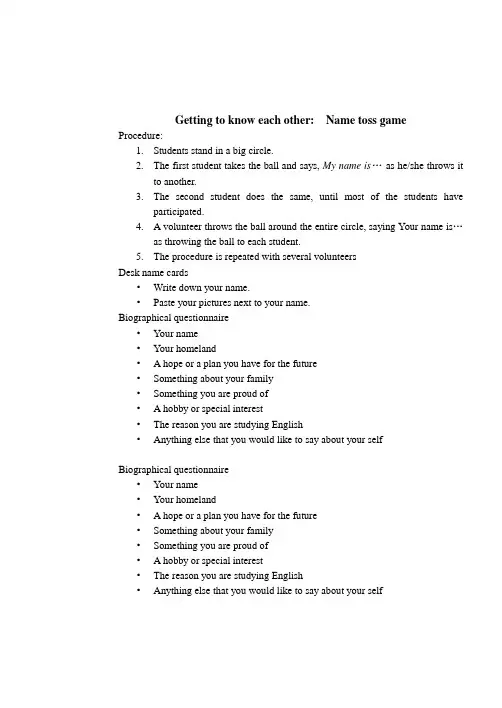
Getting to know each other: Name toss game Procedure:1.Students stand in a big circle.2.The first student takes the ball and says, My name is…as he/she throws itto another.3.The second student does the same, until most of the students haveparticipated.4. A volunteer throws the ball around the entire circle, saying Your name is…as throwing the ball to each student.5.The procedure is repeated with several volunteersDesk name cards•Write down your name.•Paste your pictures next to your name.Biographical questionnaire•Your name_____•Your homeland______• A hope or a plan you have for the future_______•Something about your family______•Something you are proud of_____• A hobby or special interest_______•The reason you are studying English_____•Anything else that you would like to say about your self______Biographical questionnaire•Your name_____•Your homeland______• A hope or a plan you have for the future_______•Something about your family______•Something you are proud of_____• A hobby or special interest_______•The reason you are studying English_____•Anything else that you would like to say about your self______Unit 1 CollegePart A●Lead-inTask 1 Study the pictures and discuss the questions below in small groups. Use the words given below if necessary.1.Who are the people in each picture? What’s their relationship?2.Where are they? What are they doing?3.Do you think they enjoy what they are doing now?Task 21.Listen and complete these dialogues.2.Retell the expereience in these dialogues by beginning with “I”, “I” can beboth A or B.Eg: (I am B.) This morning, a stranger came to ask me if the seat taken when I was in the classroom waiting for Professor Johnson to give us class. His name is Blair, a freshman. He told me that he was a little nervous about this course.Someone said this course was difficult for freshmen. I comforted him that Professor Johnson was quite a funny guy and really smart and he won’t be nervous in his class.Task 31. What did you do in the first week at college?2. What differences are there between college life and high school life?●Text A1.Expressions to learn: students are requested to give 2 or 3 examples ofeach word in Wechat as preview to the text.1) summer camp back to reality imagine doing2)in a blink explore campus get lost in3) imaginable combination dining hall4)dirt cheap fraction version5)Naiive frightening ahead of6)catch up on gossip confirm7)be piled down with keep up with scare8)informal expect sb. to do drop by9)nuisance academic expectation10)overwhelmed messy agenda2. Scanning and skimming: why college is not summer camp?3. Read the text again and answer the following questions.1)What’s the problem with buying textbooks?2)What made the writer feel frightened?3)Why did the writer love the first day of high school so much?4)Why does the writer think it’s almost impossible to join clubs orhave a little social life at college?5)What’s the writer really scared of?4.Identify the key words or main ideas of the following paragraphs (page 6,task 2)5.6. Discussion1)What’s your purpose of going to college?•For the parents•For the country•To serve the people better in the future•To get more knowledge•To get a degree2)What does going to college mean to you?●Having more fun●Making more decisions●Learning as much as possible● A bright future● A lot more than just getting a good grade3)15 things a college student should do•Learn by yourself or self-teaching•Be a volunteer once•Take part in a club or society•Cultivate a hobby•Do a part-time job•Love someone deeply; maybe find your lover for life.•Don’t forget call or write to your parents.•Try to make a business to check your financial quote•Try to organize a big activity•Read some good books•Travel out•Know about the famous people•Control your money•Make friends with students whose families are poorer than yours.•Challenges yourself6.Homework: task 3, task 4, task 5 in Page 7Part B●Lead inTask 1: Listen to the recording, and complete the following passage. Then find out the subject and the predicate in each sentence. And get familiar with the basic sentence patterns.College is a small society itself. In college, you will meet lots of people. There will be clubs, teams, parties, volunteer activities, lectures, movies, etc. You will doubtlessly have more work than you have ever had, but you will also have more free time. Also, college experience changes your ideas for life. You get rid of your feeling of importance which you had at high school and realize that in the larger picture, it doesn’t matter if you wear branded clothes or have the hottest hairstyle College also helps you feel free to start conversations with people on many topics. It’s good for you to improve your communication skills. Of course, you may feel nervous and awkward at first. It’s quite understandable. But all that will change.Apart from the enjoyment and movement, college also provides skills that you need for a wonderful career. You will have chances to learn and practice these skills. And you will get prepared for your dreamed jobs that lie ahead.Task 2 Discuss the following questions with your partner about your first year plans in college.1.How often will you go to parties with your friends?2. Are you going to join any interest groups on campus?●Text B Surviving Your Freshman Year1.New expressionsget involved with be a part ofthe most important key to sth. is…. Find a balance between … and …Barely Get by Set goals When it comes to…Spend too much time in…Be benificial to sth Get in a habitSet a schedule to sth. Dedicate time to do sth The sooner is the better. Work on sth. It is worth it. RequireA large amount of preparation and research Pat yourself on the backAs for Get familiar withAs… as possible Become involved in Better sth.2.Reading tasks in P12 and P13.3.Sentence analysis:1)It will be a pain at first, but trust me when you are finished it’s so worth it.一开始会很痛苦,但请相信,完成作业的那会儿,你会觉得这样做很值。
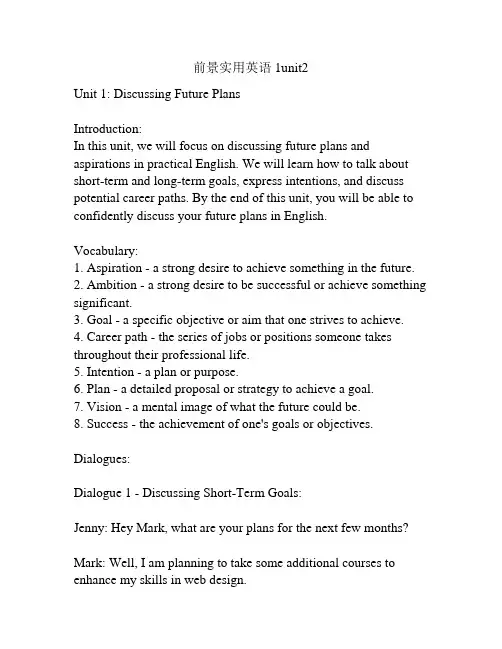
前景实用英语1unit2Unit 1: Discussing Future PlansIntroduction:In this unit, we will focus on discussing future plans and aspirations in practical English. We will learn how to talk about short-term and long-term goals, express intentions, and discuss potential career paths. By the end of this unit, you will be able to confidently discuss your future plans in English.Vocabulary:1. Aspiration - a strong desire to achieve something in the future.2. Ambition - a strong desire to be successful or achieve something significant.3. Goal - a specific objective or aim that one strives to achieve.4. Career path - the series of jobs or positions someone takes throughout their professional life.5. Intention - a plan or purpose.6. Plan - a detailed proposal or strategy to achieve a goal.7. Vision - a mental image of what the future could be.8. Success - the achievement of one's goals or objectives. Dialogues:Dialogue 1 - Discussing Short-Term Goals:Jenny: Hey Mark, what are your plans for the next few months? Mark: Well, I am planning to take some additional courses to enhance my skills in web design.Jenny: That sounds great! What is your goal behind taking those courses?Mark: My goal is to become a proficient web designer by the endof the year.Jenny: That's ambitious! I'm sure you can achieve it with your dedication.Mark: Thank you! I hope to secure a web design internship next summer to gain practical experience.Dialogue 2 - Talking about Long-Term Goals:Ryan: Sarah, have you thought about your long-term goals recently? Sarah: Yes, I have been thinking a lot about it. I want to start my own business someday.Ryan: That's fantastic! What type of business are you interested in starting?Sarah: I have always been passionate about fashion, so I am considering starting a clothing boutique.Ryan: That sounds like a great idea! I believe you have what it takes to make your boutique a success.Sarah: Thank you, Ryan! It will be a lot of hard work, but I amdetermined to achieve my dream.Dialogue 3 - Discussing Career Paths:Lisa: John, have you decided what career path you want to pursue? John: Yes, I have always been interested in medicine, so I plan to become a doctor.Lisa: That's a noble profession. How do you plan to achieve your goal?John: I am currently studying pre-med and plan to apply to medical school after graduation.Lisa: That's impressive! I'm sure you will make a great doctor one day.John: Thank you, Lisa. It's a long journey, but I am excited about the possibilities.Grammar Points:1. Using the present continuous tense to talk about future plans: Example: I am planning to travel to Europe next summer.2. Using modal verbs to express intentions and possibilities: Example: I hope to secure a job in finance after completing mydegree.3. Using future tense to discuss long-term goals:Example: I will start my own business in five years.4. Using present tense to talk about aspirations and career paths: Example: I have always been interested in becoming a teacher.5. Using adverbs of time to indicate future plans:Example: I am planning to take a vacation next month. Conclusion:In this unit, we have learned how to discuss future plans in practical English. We have explored vocabulary related to aspirations, goals, intentions, and career paths. We have also practiced using different tenses and modal verbs to express future plans and ambitions. With these skills, you will be able to confidently communicate your future plans in English.。
This is the first unit of Book one.1. Study the pictures and give a brief discuss the three questions aboutlead-in talk on description university’s life words and phrases so as to define them.2. Words and Phrases:a. Students, classmates, sports friends.b. Classroom, football field, library, listening, playing, looking for.c. Very much so, not at all.d. on the right ,on the left.e. Lecture theater...f.jump,head ,goalg. freshman,sophomore ,junior,senior...3. Have the students listen to dialogue 1 (2-3 times) and fill in the blanks with the missing words;4. Ask one student to read aloud the talk, so students can check their completed answers; Present more words and phrases about description University’s life, make sure students know how to use those added words and phrases, and organize the activity to accomplish dialogue 2.5. After a brief explanation of the dialogue1-2, the teacher gives the students a few minutes to think about the questions in the task3.6. Ask students to answer the questions about the task3.(1-2 period)A. Lets the students answer the text-related questions(in the exercises), helps them identify the main idea of each paragraph.B.Analyzes some language points while discussing the whole text with the students.Language Pointsv. to form a picture in your mind of what somethingmight bee.g. She imagined singing her favorite song on a big stage.她想象着自己在一个巨大的舞台上唱自己最喜欢的歌曲。
Getting to know each other: Name toss game Procedure:1.Students stand in a big circle.2.The first student takes the ball and says, My name is…as he/she throws itto another.3.The second student does the same, until most of the students haveparticipated.4. A volunteer throws the ball around the entire circle, saying Your name is…as throwing the ball to each student.5.The procedure is repeated with several volunteersDesk name cards•Write down your name.•Paste your pictures next to your name.Biographical questionnaire•Your name_____•Your homeland______• A hope or a plan you have for the future_______•Something about your family______•Something you are proud of_____• A hobby or special interest_______•The reason you are studying English_____•Anything else that you would like to say about your self______Biographical questionnaire•Your name_____•Your homeland______• A hope or a plan you have for the future_______•Something about your family______•Something you are proud of_____• A hobby or special interest_______•The reason you are studying English_____•Anything else that you would like to say about your self______Unit 1 CollegePart A●Lead-inTask 1 Study the pictures and discuss the questions below in small groups. Use the words given below if necessary.1.Who are the people in each picture? What’s their relationship?2.Where are they? What are they doing?3.Do you think they enjoy what they are doing now?Task 21.Listen and complete these dialogues.2.Retell the expereience in these dialogues by beginning with “I”, “I” can beboth A or B.Eg: (I am B.) This morning, a stranger came to ask me if the seat taken when I was in the classroom waiting for Professor Johnson to give us class. His name is Blair, a freshman. He told me that he was a little nervous about this course.Someone said this course was difficult for freshmen. I comforted him that Professor Johnson was quite a funny guy and really smart and he won’t be nervous in his class.Task 31. What did you do in the first week at college?2. What differences are there between college life and high school life?●Text A1.Expressions to learn: students are requested to give 2 or 3 examples ofeach word in Wechat as preview to the text.1) summer camp back to reality imagine doing2)in a blink explore campus get lost in3) imaginable combination dining hall4)dirt cheap fraction version5)Naiive frightening ahead of6)catch up on gossip confirm7)be piled down with keep up with scare8)informal expect sb. to do drop by9)nuisance academic expectation10)overwhelmed messy agenda2. Scanning and skimming: why college is not summer camp?3. Read the text again and answer the following questions.1)What’s the problem with buying textbooks?2)What made the writer feel frightened?3)Why did the writer love the first day of high school so much?4)Why does the writer think it’s almost impossible to join clubs orhave a little social life at college?5)What’s the writer really scared of?4.Identify the key words or main ideas of the following paragraphs (page 6,task 2)5.6. Discussion1)What’s your purpose of going to college?•For the parents•For the country•To serve the people better in the future•To get more knowledge•To get a degree2)What does going to college mean to you?●Having more fun●Making more decisions●Learning as much as possible● A bright future● A lot more than just getting a good grade3)15 things a college student should do•Learn by yourself or self-teaching•Be a volunteer once•Take part in a club or society•Cultivate a hobby•Do a part-time job•Love someone deeply; maybe find your lover for life.•Don’t forget call or write to your parents.•Try to make a business to check your financial quote•Try to organize a big activity•Read some good books•Travel out•Know about the famous people•Control your money•Make friends with students whose families are poorer than yours.•Challenges yourself6.Homework: task 3, task 4, task 5 in Page 7Part B●Lead inTask 1: Listen to the recording, and complete the following passage. Then find out the subject and the predicate in each sentence. And get familiar with the basic sentence patterns.College is a small society itself. In college, you will meet lots of people. There will be clubs, teams, parties, volunteer activities, lectures, movies, etc. You will doubtlessly have more work than you have ever had, but you will also have more free time. Also, college experience changes your ideas for life. You get rid of your feeling of importance which you had at high school and realize that in the larger picture, it doesn’t matter if you wear branded clothes or have the hottest hairstyle College also helps you feel free to start conversations with people on many topics. It’s good for you to improve your communication skills. Of course, you may feel nervous and awkward at first. It’s quite understandable. But all that will change.Apart from the enjoyment and movement, college also provides skills that you need for a wonderful career. You will have chances to learn and practice these skills. And you will get prepared for your dreamed jobs that lie ahead.Task 2 Discuss the following questions with your partner about your first year plans in college.1.How often will you go to parties with your friends?2. Are you going to join any interest groups on campus?●Text B Surviving Your Freshman Year1.New expressionsget involved with be a part ofthe most important key to sth. is…. Find a balance between … and …Barely Get by Set goals When it comes to…Spend too much time in…Be benificial to sth Get in a habitSet a schedule to sth. Dedicate time to do sth The sooner is the better. Work on sth. It is worth it. RequireA large amount of preparation and research Pat yourself on the backAs for Get familiar withAs… as possible Become involved in Better sth.2.Reading tasks in P12 and P13.3.Sentence analysis:1)It will be a pain at first, but trust me when you are finished it’s so worth it.一开始会很痛苦,但请相信,完成作业的那会儿,你会觉得这样做很值。